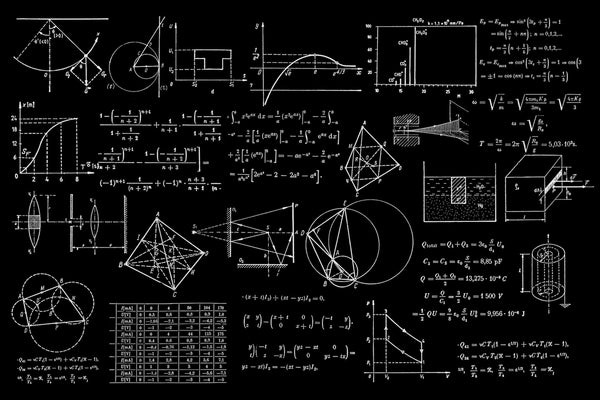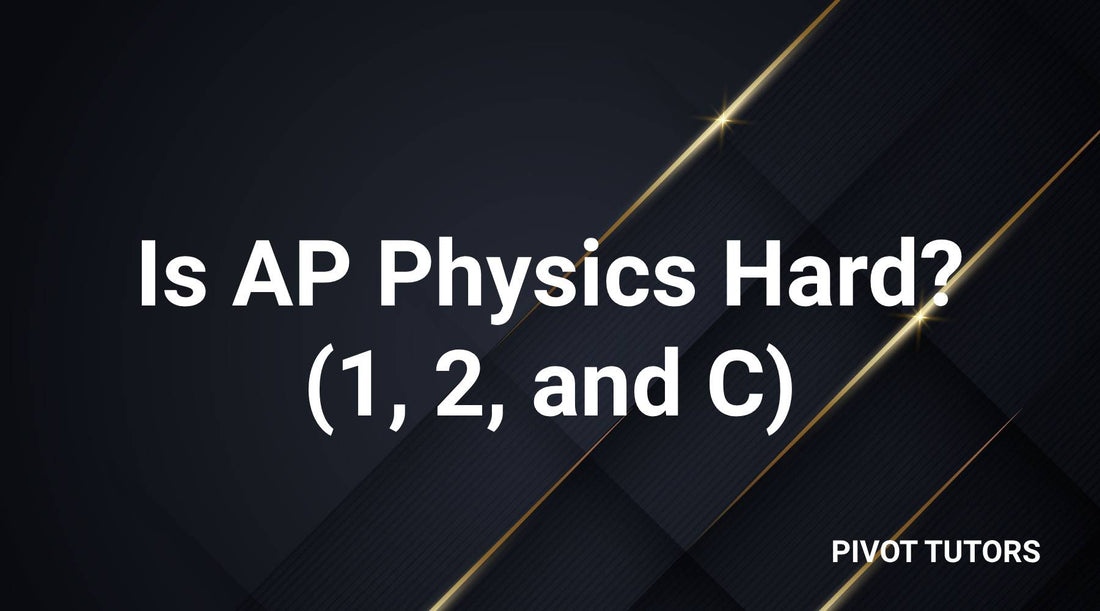In this comprehensive blog post, we're diving deep into a question that often sparks curiosity and sometimes anxiety: "Is AP Physics Hard?" Whether you're considering AP Physics 1, 2, or delving into the more specialized AP Physics C courses in Mechanics and Electricity & Magnetism, understanding the challenges and expectations of these courses is crucial.
AP Physics is not just another high school course; it's a journey into the fundamentals of how our universe operates. But with great knowledge comes great challenge.
This post aims to demystify the complexities and rumors surrounding the difficulty of AP Physics. We'll explore what each course covers, why many students find it challenging, and how it compares to other AP courses and within its own family of Physics courses.
Whether you're a student planning your academic path or a parent like myself, striving to guide your high-performing child through their educational journey, this post is your roadmap to understanding AP Physics. So, let's unravel the mysteries of one of the most intriguing and demanding AP subjects.
Is AP Physics Hard?
The straightforward answer to whether AP Physics is hard is: it depends. It depends on the student's math and science background, dedication to understanding complex concepts, and ability to apply theoretical knowledge in practical scenarios. AP Physics is known for its rigorous curriculum, which demands a higher level of abstract thinking and problem-solving skills compared to many other high school courses.
What Does AP Physics 1 Cover?
AP Physics 1 is an introductory, algebra-based course that explores the fundamental principles of physics. It's designed for students who have no prior physics experience, making it a first step into the world of physics.
The course primarily focuses on classical mechanics, including Newtonian mechanics (motion, forces, energy, momentum), rotational motion, gravitational forces, and simple harmonic motion.
In addition to these, there's an emphasis on understanding and applying scientific principles, using mathematical reasoning, and performing qualitative and quantitative analysis.
The curriculum also incorporates a significant laboratory component, where students engage in hands-on experiments to reinforce their understanding of theoretical concepts. This practical approach not only aids in comprehending complex theories but also develops critical thinking and scientific inquiry skills.
What Makes AP Physics Challenging?
The challenge of AP Physics lies not just in its content, but in how it requires students to think and apply concepts. There are several key factors that contribute to its difficulty:
Algebra-based Challenges
Unlike other introductory science courses, AP Physics 1 and 2 are algebra-based. This means students must have a strong grasp of algebra to succeed. The courses demand that students not only understand physical concepts but also translate them into mathematical formulas and vice versa.
This dual demand of conceptual understanding and mathematical proficiency can be a significant hurdle for those who are less confident in their math skills.
Emphasis on Hands-on Lab Experiments
AP Physics courses heavily emphasize laboratory work. This practical component requires students to apply theoretical knowledge in real-world scenarios, a skill that is as challenging as it is essential.
These labs are not just about following instructions; they require designing experiments, interpreting data, and understanding the implications of results. While beneficial for learning, this hands-on approach adds another layer of complexity to the course.
High Failure and Low 5-Score Rates
One of the most telling indicators of the difficulty of AP Physics are the exam statistics and pass rates. Historically, AP Physics courses have some of the highest failure rates and lowest percentages of students scoring a 5 (the highest score possible) among all AP subjects.
Exam Statistics and Pass Rates
For instance, AP Physics 1 has one of the lowest 5-score rates across all AP exams. This is not necessarily a reflection of poor teaching or student preparation, but rather an indication of the course's rigorous standards and the challenging nature of the exam itself.
The exam tests not just rote memorization but a deep understanding of concepts and the ability to apply them in varied contexts. These statistics underscore the importance of thorough preparation and consistent effort throughout the course.

How Does AP Physics 1 Compare to Other Types of AP Physics?
Understanding the differences between the various AP Physics courses is crucial for students deciding which path to take. Each course has its unique focus and level of difficulty.
AP Physics 2
While AP Physics 1 focuses on classical mechanics and basic principles, AP Physics 2 delves into other areas of physics like fluid mechanics, thermodynamics, electricity and magnetism, optics, and atomic and nuclear physics.
Although it covers different content, it's also an algebra-based course and can be considered a continuation of AP Physics 1. The level of difficulty is comparable to AP Physics 1, but it may seem more challenging due to the introduction of more abstract concepts and a broader range of topics.
AP Physics C: Mechanics
AP Physics C: Mechanics is more advanced than AP Physics 1 and 2. It's calculus-based, targeting college students interested in pursuing physical science or engineering.
This course goes deeper into topics covered in AP Physics 1, like motion, force, and energy, but with a more rigorous and mathematical approach. The use of calculus makes it more challenging and suitable for students who have a strong background in both physics and calculus.
AP Physics C: Electricity and Magnetism
Similarly, AP Physics C: Electricity and Magnetism is also calculus-based and is often taken after AP Physics C: Mechanics. This course focuses on concepts like electric fields, magnetic fields, circuits, and electromagnetic waves.
The calculus requirement adds to its complexity, making it one of the most challenging AP courses. It's ideal for students who have successfully navigated AP Physics C: Mechanics and have a solid understanding of calculus.
How Does AP Physics Compare To Other AP Courses?
When comparing AP Physics to other AP courses, several factors set it apart in terms of difficulty and the skills it develops.
Analytical and Conceptual Depth: AP Physics, especially in its C variants, is often considered more challenging than many other AP courses due to its heavy reliance on analytical skills and deep conceptual understanding.
While courses like AP History or AP English focus more on content memorization and analytical writing, AP Physics requires a strong grasp of complex concepts and the application of mathematical formulas to solve problems.
Mathematical Rigor: The level of math in AP Physics, particularly in the C courses, is more advanced than in most other AP subjects. While other courses may incorporate basic algebra or statistics, AP Physics C requires a solid understanding of calculus, making it more challenging for students who are not as strong in mathematics.
Laboratory Component: Unlike many other AP courses, AP Physics includes a significant laboratory component. This practical aspect requires students to apply theoretical knowledge in experimental settings, a skill that is not emphasized as much in other AP subjects.
Cross-Disciplinary Skills: AP Physics is unique in how it blends physics knowledge with mathematical skills. This cross-disciplinary approach is less common in other AP courses, which tend to focus more narrowly on their specific subject matter.
Scoring and Pass Rates: Historically, AP Physics courses have lower pass rates and fewer top scores compared to subjects like AP Psychology or AP Government. This is a testament to the challenging nature of the subject and the rigorous assessment methods used in the AP Physics exams.
Frequently Asked Questions
Navigating the world of AP Physics can often bring up a number of questions. Here are answers to some of the most frequently asked questions:
Is AP Physics 1 Harder Than AP Physics C?
Comparing the difficulty of AP Physics 1 and AP Physics C is not straightforward, as it depends on the student's background and strengths. AP Physics 1 is an algebra-based course focused on fundamental physics concepts, making it accessible for students without a strong math background.
On the other hand, AP Physics C is calculus-based, delving deeper into mechanics and electricity & magnetism. It's generally considered more challenging due to the advanced math involved and the depth of physics topics covered.
How Much Math Is Involved in AP Physics?
The level of math in AP Physics varies by course. AP Physics 1 and 2 are algebra-based and require a good grasp of algebra and trigonometry. AP Physics C, however, is calculus-based and requires students to have, at minimum, a concurrent enrollment in calculus.
The C courses integrate calculus concepts throughout the curriculum, making them more math-intensive.
What Are the Best Resources for Studying AP Physics?
There are numerous resources available for studying AP Physics, including textbooks, online courses, and practice exams. Some top resources include the official College Board materials, Khan Academy for video tutorials, and physics forums like Physics Forums and HyperPhysics for more in-depth discussions.
Additionally, review books from publishers like Barron's and Princeton Review can be helpful for exam preparation.
Can I Take AP Physics Without Prior Physics Coursework?
Yes, taking AP Physics without prior physics coursework is possible, especially AP Physics 1, which is designed as an introductory course. However, having a background in basic physics concepts can be beneficial.
It's more important to have a strong foundation in the necessary math skills is more important. For AP Physics C, prior physics knowledge is highly recommended due to the advanced level of the course content.

Conclusion: How Hard Is AP Physics?
In wrapping up our exploration of AP Physics, it's clear that while the courses are challenging, their difficulty is not insurmountable. The level of challenge largely depends on the individual student's strengths, background in math and science, and their commitment to understanding complex concepts.
AP Physics 1 and 2, being algebra-based, are more accessible for students without a strong background in calculus. They provide a solid foundation in physics principles and encourage a conceptual understanding of the subject. However, the AP Physics C courses, with their calculus-based curriculum, are undeniably more rigorous and suited for students who have a strong grasp of both advanced math and physics concepts.
The true difficulty of AP Physics lies not just in its theoretical content but in its demand for a high level of analytical thinking, problem-solving skills, and the ability to apply abstract concepts to real-world situations. The courses are designed not only to challenge but also to foster a deep understanding of the physical universe and to develop critical scientific skills.
So, is AP Physics hard? Yes, it can be. But it's also immensely rewarding. For those willing to put in the effort, AP Physics offers a rich and comprehensive understanding of the fundamental principles that govern our world, laying a strong foundation for any future study or career in science and engineering.
Looking for more information about AP Physics?
Download our comprehensive class guide by clicking the thumbnail below, or visit our AP Physics page to learn more about tutoring support.


